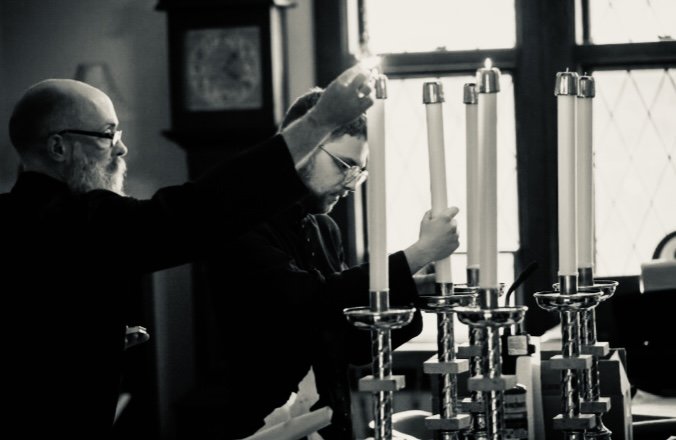When Love Meets the World
During this season of Lent, we are considering the theme of pilgrimage, what it means, where joy may be found during our sojourn. In the following reflection, Nashotah House senior student, Micah Hogan, considers the clinging to Jesus in the desert, to be left with nothing else to cling to but Him.
By Micah Hogan, senior at Nashotah House
If you’ve ever heard anything about the Sahara Desert, you might be surprised to hear that it was once under water. A study by the National Science Foundation actually found fossils of giant sea snakes and catfish deep in the Sahara, the largest and hottest desert on earth. Even when we are faced with all the evidence, it's hard to wrap our minds around a transition so dramatic and far reaching. But this is what happens not only in the world around us, but deep within us, as Psalm 63 reminds us.
Like all the great epics of old, the psalm begins in media res, right in the middle of the action.
O God, you are my God; earnestly I seek you;
my soul thirsts for you;
my flesh faints for you,
as in a dry and weary land where there is no water.
The Psalmist finds himself with a thirsty soul and fainting flesh, in an interior desert, a dry and weary land where there is no water. The psalm’s title invites us to read the psalm through David’s eyes, surveying the wilderness of Judah and seeing there an external mirror of his soul, a land dry and thirsty.
But why is the desert thirsty? At least sometimes, it is because the desert was once an ocean, and it had once tasted water. And this also is true for the Psalmist.
So I have looked upon you in the sanctuary,
beholding your power and glory.
Why is the Psalmist so thirsty? Because they have looked upon God’s power and glory. They’ve tasted the ocean of God’s very presence and power and love. The Psalmist is desperate because he has seen and been ravished by Divine Love.
Historically, the Western Church has spoken of this phenomenon by using the language of created and uncreated grace. Uncreated grace, God’s very presence, meets the soul and forever changes it. It creates within it a place and a relationship and a longing for God, what the church calls created grace— literally a graced place created in us by the holy, cleansing, burning presence of the Uncreated One.
“Your steadfast love is better than life.” These are the words of one who knows from experience, who has seen the divine power and glory. Life is no longer the same. Life can never be the same. It can no longer be the source of joy and fullness and completeness. By passing through the Red Sea of God’s love the pleasures of Egypt become just another mirage, leaving us with nothing but desert. The fat of life has been turned to a lean wanting, into thirsty souls and failing flesh. Into neediness and desperation and burning like the bush in the wilderness. We are wounded and scarred by love, never to be the same. This is what Divine Love does to us.
And this is grace. Sheer grace, created grace. The grace that St. John of the Cross called the dark night of the soul. For God is both in the ocean and in the desert. This burning fire and failing flesh is nothing other than the fiery heart of chastity. This and nothing else is purity of heart, this inner wilderness and unquenchable thirst satisfied by nothing less than Love Himself. This and nothing else is the burning flame of the seraphim, the very flame of Yah.
For it is here, even here in the wilderness, the wilderness outside the camp, outside the promised land, where we glimpse the serpent of bronze lifted high, the seraphic Christ upon the cross, wounded and wounding. It’s here in the aftermath that love meets the world and it’s here in the desert of our longing that we find our only satiety.
My soul will be satisfied as with fat and rich food,
and my mouth will praise you with joyful lips,
when I remember you upon my bed,
and meditate on you in the watches of the night;
for you have been my help,
and in the shadow of your wings I will sing for joy.
My soul clings to you;
your right hand upholds me.
It's here in the desert where we meet Jesus, and it's in the desert that we feast, feast on Him, feast on love. For this and nothing else is joy: to have met Jesus and to cling to Him in the desert, to be left with nothing else to cling to but Him.
Take me to you, imprison me, for I,
Except you enthrall me, never shall be free,
Nor ever chaste, except you ravish me.
-John Donne
Micah Hogan is a senior at Nashotah House and a deacon in the ACNA, under obedience to the Bishop of San Joaquin. He received his BA in Biblical and Theological Studies from Biola University and is a “chum” of the Torrey Honors College. He is particularly interested in exploring and communicating the role of eros in the Chrisian tradition. He loves poetry, trees, and California culture. The preceding Lenten reflection is from the readings for Lent, Lectionary Year C, Psalm 63:1-8; Daniel 12:1-4; and Revelation 3:1-6.

